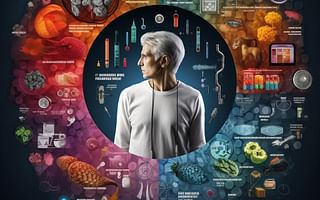🥦 Diet and Dementia: An Interactive Quiz 🧠
Diet and Dementia: An Interactive Quiz
Test your knowledge on the connection between diet and dementia, dietary management tips, and the role of hydration.
Discover the Connection Between Diet and Dementia: Take Our Interactive Quiz
Are you curious about how diet can impact the progression of dementia? Do you want to learn more about dietary management tips and the role of hydration in dementia care? Test your knowledge with our interactive quiz!
Question 1: How does an individual's diet influence the progression of dementia?
- It has no significant influence
- It can slow down the progression
- It can speed up the progression
- Both B and C
Correct Answer: Both B and C
Explanation: A person's diet can both slow down and speed up the progression of dementia. The food we eat plays a crucial role in brain health and can either support or hinder cognitive function.
Question 2: What types of diets show a higher risk of developing dementia?
- Low fat, low sugar, and low sodium diets
- Balanced diets
- High fat, high sugar, and high sodium diets
- Vegetarian diets
Correct Answer: High fat, high sugar, and high sodium diets
Explanation: Studies have shown that diets high in fat, sugar, and sodium increase the risk of developing dementia. It is important to be mindful of our dietary choices and opt for healthier alternatives.
Question 3: What are some steps to switch from a processed food diet to a nutrient-rich diet?
- Include more processed foods
- Eliminate processed foods and include fresh fruits, vegetables, lean proteins, and whole grains
- Include more sugary drinks
- None of the above
Correct Answer: Eliminate processed foods and include fresh fruits, vegetables, lean proteins, and whole grains
Explanation: To switch to a nutrient-rich diet, it is essential to eliminate processed foods and focus on consuming fresh, whole foods. This includes incorporating a variety of fruits, vegetables, lean proteins, and whole grains into your meals.
Question 4: Which diets are suggested for Alzheimer's prevention?
- Fast food diet
- Mediterranean diet and the DASH diet
- High sugar diet
- None of the above
Correct Answer: Mediterranean diet and the DASH diet
Explanation: The Mediterranean diet and the DASH (Dietary Approaches to Stop Hypertension) diet have been suggested for Alzheimer's prevention. These diets emphasize whole foods, lean proteins, healthy fats, and limited processed foods.
Question 5: How does hydration impact dementia?
- It has no impact
- Dehydration can lead to confusion and exacerbate dementia symptoms
- It can cause dementia
- None of the above
Correct Answer: Dehydration can lead to confusion and exacerbate dementia symptoms
Explanation: Hydration plays a crucial role in maintaining cognitive function. Dehydration can lead to confusion, worsen dementia symptoms, and negatively affect overall well-being. It is important to ensure proper hydration for individuals with dementia.
Question 6: What vitamins and minerals have been associated with brain health?
- B-vitamins, antioxidants, and omega-3 fatty acids
- Vitamin C and calcium
- Vitamin D and iron
- None of the above
Correct Answer: B-vitamins, antioxidants, and omega-3 fatty acids
Explanation: B-vitamins, antioxidants, and omega-3 fatty acids have been associated with brain health. These nutrients support cognitive function and help maintain brain health as we age.
By understanding the connection between diet and dementia, you can make informed choices to support brain health and overall well-being. Remember, a nutrient-rich diet, proper hydration, and essential vitamins and minerals are vital components of dementia care.
For more comprehensive resources and compassionate advice on managing dementia, visit Dementia Care Tips. We provide valuable insights into recognizing the signs of end-stage dementia, understanding the stages of Lewy body dementia, and supporting individuals with specific conditions such as childhood dementia, vascular dementia, and Alzheimer's dementia.
Take control of your loved one's dementia care journey. Start by exploring the impact of diet and making informed choices today.


